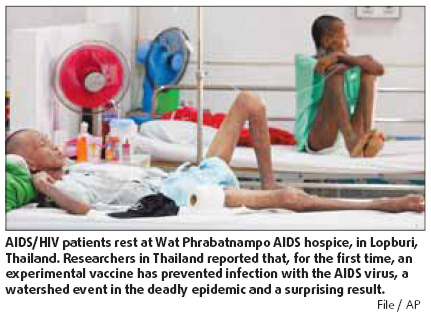
|
WORLD> Global General
 |
|
AIDS vaccine within reach
(China Daily)
Updated: 2009-09-25 08:07 BANGKOK: For the first time, an experimental vaccine has prevented infection with the AIDS virus, a watershed event and a surprising result after recent failures led many scientists to wonder whether a vaccine would ever be found.  The vaccine cut the risk of a person becoming infected with HIV by more than 31 percent in trials conducted with the help of 16,000 volunteers in Thailand.
Kim stressed that the vaccine may not work in the groups where HIV is most common - in Africa, among gay men and among intravenous drug users. "The vaccine was tested in Thailand and it is really specific for the strains that are circulating in Thailand now," Kim said. The institute's director, Anthony Fauci, PhD, said this is "not the end of the road", but told reporters he was surprised and very pleased by the outcome. "It gives me cautious optimism about the possibility of improving this result" and developing a more effective AIDS vaccine, Fauci said. "This is something that we can do." Even a marginally helpful vaccine could have a big impact. Every day, 7,500 people worldwide are infected with HIV. Two million people died of AIDS in 2007, the UN agency UNAIDS estimates. "Today marks an historic milestone," said Mitchell Warren, executive director of the AIDS Vaccine Advocacy Coalition. "It will take time and resources to fully analyze and understand the data, but there is little doubt that this finding will energize and redirect the AIDS vaccine field," he said in a statement. The Thailand Ministry of Public Health conducted the study. The trials tested the efficiency of a two-vaccine combo in a "prime-boost" approach, where the first one primed the immune system to attack HIV and the second one strengthened the response. The drugs used were ALVAC, from Sanofi Pasteur, the vaccine division of French drugmaker Sanofi-Aventis; and AIDSVAX, originally developed by VaxGen Inc. and now held by Global Solutions for Infectious Diseases, a nonprofit founded by some former VaxGen employees. ALVAC uses canarypox, a bird virus altered so it can't cause human disease, to ferry synthetic versions of three HIV genes into the body. AIDSVAX contains a genetically engineered version of a protein on HIV's surface. The vaccines are not made from whole virus - dead or alive - and cannot cause HIV. Neither vaccine in the study prevented HIV infection when tested individually in earlier trials and dozens of scientists called the new trials futile when they began in 2003. "I really didn't have high hopes at all that we would see a positive result," Fauci confessed. The results proved the skeptics wrong. The study tested the combo among HIV-negative Thai men and women aged 18 to 30 at average risk of becoming infected. Half received four "priming" doses of ALVAC and two "boost" doses of AIDSVAX over six months. The others received dummy shots. No one knew who got what until the study ended. All were given condoms, counseling and treatment for any sexually transmitted infections, and all were tested every six months for HIV. Any who became infected were given free treatment with antiviral medicines. Participants were followed for three years after vaccination ended. New infections occurred in 51 of the 8,197 given the vaccine and in 74 of the 8,198 who received dummy shots. That worked out to a 31 percent lower risk of infection for the vaccine group. AP - Reuters |
|||||||